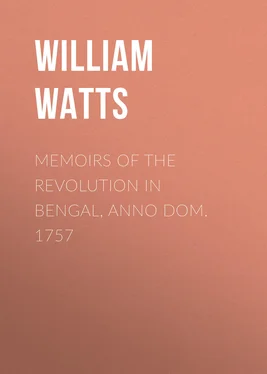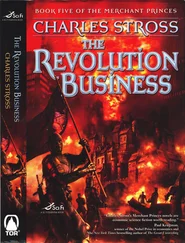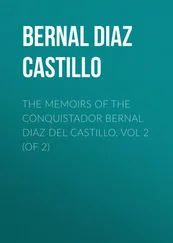William Watts - Memoirs of the Revolution in Bengal, Anno Dom. 1757
Здесь есть возможность читать онлайн «William Watts - Memoirs of the Revolution in Bengal, Anno Dom. 1757» — ознакомительный отрывок электронной книги совершенно бесплатно, а после прочтения отрывка купить полную версию. В некоторых случаях можно слушать аудио, скачать через торрент в формате fb2 и присутствует краткое содержание. Жанр: foreign_prose, История, foreign_edu, foreign_antique, на английском языке. Описание произведения, (предисловие) а так же отзывы посетителей доступны на портале библиотеки ЛибКат.
- Название:Memoirs of the Revolution in Bengal, Anno Dom. 1757
- Автор:
- Жанр:
- Год:неизвестен
- ISBN:нет данных
- Рейтинг книги:4 / 5. Голосов: 1
-
Избранное:Добавить в избранное
- Отзывы:
-
Ваша оценка:
- 80
- 1
- 2
- 3
- 4
- 5
Memoirs of the Revolution in Bengal, Anno Dom. 1757: краткое содержание, описание и аннотация
Предлагаем к чтению аннотацию, описание, краткое содержание или предисловие (зависит от того, что написал сам автор книги «Memoirs of the Revolution in Bengal, Anno Dom. 1757»). Если вы не нашли необходимую информацию о книге — напишите в комментариях, мы постараемся отыскать её.
Memoirs of the Revolution in Bengal, Anno Dom. 1757 — читать онлайн ознакомительный отрывок
Ниже представлен текст книги, разбитый по страницам. Система сохранения места последней прочитанной страницы, позволяет с удобством читать онлайн бесплатно книгу «Memoirs of the Revolution in Bengal, Anno Dom. 1757», без необходимости каждый раз заново искать на чём Вы остановились. Поставьте закладку, и сможете в любой момент перейти на страницу, на которой закончили чтение.
Интервал:
Закладка:
I. Whatever Rights and Privileges the King has granted the English Company, in their Phirmaund, and the Hushulhoorums sent from Delly , shall not be disputed, or taken from them; and the Immunities therein mentioned, be acknowleged and stand good. Whatever Villages are given the Company by the Phirmaund, shall likewise be granted, notwithstanding they have been denied by former Subahs. The Zemindars of those Villages not to be hurt or displaced, without Cause.
I agree to the Terms of the Phirmaund.
II. All Goods passing and repassing through the Country, by Land or Water, with English Dusticks, shall be exempt from any Tax, Fee, or Imposition whatever.
I agree to this.
III. All the Company's Factories, seized by the Nabob, shall be returned. All Monies, Goods, and Effects, belonging to the Company, their Servants and Tenants, and which have been seized and taken by the Nabob, shall be restored; what has been plundered and pillaged by his People, made good by the Payment of such a Sum of Money, as his Justice shall think reasonable.
I agree to restore whatever has been seized and taken by my Orders, and accounted for in my Sincary.
IV. That we have Permission to fortify Calcutta , in such Manner as we may think proper, without Interruption.
I consent to this.
V. That we shall have Liberty to coin Siccas, both of Gold and Silver, of equal Weight and Fineness with those of Muxadavad , which shall pass in the Provinces.
I consent to the English Company's coining their own Imports of Bullion and Gold into Siccas .
VI. That a Treaty shall be ratified, by Signing and Sealing, and swearing to abide by the Articles therein contained; not only by the Nabob, but his principal Officers and Ministers.
I have sealed and signed the Articles, before the Presence of God.
VII. That Admiral Watson and Colonel Clive , on the Part and Behalf of the English Nation, and of the Company, do agree to live in a good Understanding with the Nabob, to put an End to these Troubles, and to be in Friendship with him, while these Articles are performed and observed by the Nabob.
I have sealed and signed the foregoing Articles, upon these Terms, that if the Governor and Council will sign and seal them, with the Company's Seal, and will swear to the Performance on their Part, I then consent and agree to them.
In this Treaty, the intelligent Reader will see, there were Three great Points sufficiently explained, to shew the Injustice and Oppression of the Suba, in his Attack upon the English Settlements, even upon Reflection in his own Opinion, tho' far from being as conclusive in respect to the Remedies and Indemnifications, that, in consequence of so full a Declaration, were to be procured. The First regarded the Possessions, Immunities, and Privileges, conceded to the East India Company, by the Royal Phirmaund, which Suraja Dowlat acknowleged to have violated, promised Restitution, and undertook, in the most solemn Manner, not to invade them again. But as this was conceived only in general Terms, these Rights, and the Limits of their respective Possessions, required a thorough Discussion. The next was, as to the Fortifications of Calcutta ; the Legality and Expediency of which he now admitted in their utmost Extent, as being plainly necessary to the Security of the Place, the British Inhabitants, and even of the Mogul 's Subjects, living under its Protection; and to this was added, the Coinage of their own Imports, in Gold and Silver, to which they had always a Right, though it had not been exercised. The last was, the full and immediate Compensation, which he stipulated, for all the Damages the Company, and those dependent upon it, had sustained; but which he contracted only to make, so far as the Produce of the Plunder should appear to have come into his Hands. It was evident, therefore, that, though in Words and in Appearance much had been obtained by the Peace, this still depended, in a great Measure, as to the most material Part, the Performance, on the proper Settling of these Articles, and the Liquidation of the Damages, in reference to which, the Sincerity of the Suba's Intention, and his Readiness to execute what he had undertaken, was almost the sole Security. In order to adjust these Points, without which the Treaty was of very little Consequence to those ruined and undone by the War, the Select Committee very properly made choice of Mr. William Watts , who had been their Chief at Cassimbuzar , who was one of the Members of that Committee, a Person well known to the Nabob, and who had been, as the Suba himself owned, the first innocent and causeless Victim to his Resentment, or rather Caprice. His Acceptance of this Commission, by which he was again to put himself into the Power of this unsteady Prince, in so critical a Conjuncture, and charged with so troublesome and intricate a Negotiation, was a very full Proof of his Fidelity to, and Zeal for, the Interests of the Company; as it likewise was an evident Testimony of the good Opinion of his Associates; who, upon mature Deliberation, invested him solely with so great a Trust.
He was, indeed, in every respect, fittest for this Employment (had there been any Competitor); an Employment, by far the weightiest, and of the most Consequence, of any in Bengal . He had been many Years in the Country; was well acquainted with the Language, as well as accustomed to the Manners and Disposition of the Inhabitants; was much esteemed, and had many Connections with them. He understood their Politics also, at least as much as such fluctuating Politics as theirs could be understood; the true Interest of the Province, and the Constitution of Indostan in general, and the State of the neighbouring Governments in particular. Besides, he was personally known to all the Ministers, and had received very singular Marks of Esteem from the Suba himself. Add to all this, that the Company, in case of the Death or Resignation of Mr. Drake , had appointed this Gentleman to the Government of Calcutta , which, taken together, proves, that this Choice was not the Work of Chance or Favour, but proceeded from mature Deliberation, and a just Regard to the Consequence of that Negotiation, in which he was to be employed.
The Perplexities springing from such a Variety and Complication of Matters that were to be adjusted, the Mutability of the Suba's Nature, and his Want of Judgment and Experience, and the Difficulties naturally arising in settling the Concessions, which had been just extorted from him by Treaty, were not the only Circumstances that embarrassed this Negotiation. The French , perfectly well informed of every Step taken or intended, and no less skilled in the Art of Intrigue, had most effectually retained several of those whom the Suba frequently consulted, or chiefly trusted, in their Interest by gratifying them with Presents. They had still a more powerful Tie on them than this, being in Debt Thirteen Lack of Rupees, or upwards of One hundred and Sixty thousand Pounds Sterling, to Juggut Seat , the greatest Banker in the Empire of Indostan , and the Second in Power in Bengal ; to whose Advice for many Years past the Subas paid the greatest Attention. They very well knew, that Men might be false to their Benefactors; but they rightly judged, that even the worst of Men, more especially when avaricious, would be true, where they could not possibly be false, without betraying their own Interest. Under Circumstances like these, there was no Probability, indeed there was no Possibility, of so much as attempting any Thing, but in the Mode of the Court; that is, by opposing Corruption to Corruption, making Friends of the Mammon of Unrighteousness, and getting upon even Ground with those, with whom they were obliged to contend.
Читать дальшеИнтервал:
Закладка:
Похожие книги на «Memoirs of the Revolution in Bengal, Anno Dom. 1757»
Представляем Вашему вниманию похожие книги на «Memoirs of the Revolution in Bengal, Anno Dom. 1757» списком для выбора. Мы отобрали схожую по названию и смыслу литературу в надежде предоставить читателям больше вариантов отыскать новые, интересные, ещё непрочитанные произведения.
Обсуждение, отзывы о книге «Memoirs of the Revolution in Bengal, Anno Dom. 1757» и просто собственные мнения читателей. Оставьте ваши комментарии, напишите, что Вы думаете о произведении, его смысле или главных героях. Укажите что конкретно понравилось, а что нет, и почему Вы так считаете.












